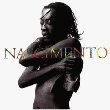|
|

Milton Nascimento Milton Nascimento's highly anticipated release Nascimento finally reached the world market on June 10. Initially scheduled for earlier this year, Nascimento was delayed because of a documentary that Warner Bros. wanted to release about Milton Nascimento. Furthermore, Milton's health problems prevented him from touring to promote this album. The Brazilian critics were divided when writing about Nascimento. Being this year the 25th anniversary of Milton's landmark release Clube da Esquina, it is understandable that expectations were high. Nascimento is a mixed release with ups and downs. There seems to be a little bit of everything Milton has done in his career in Nascimento. The search for his home land is present with the heavy drum percussion in Louva-a-Deus (The Praying Mantis), Janela para o Mundo (Window To The World), and Os Tambores de Minas (Minas Drums). The repique and folia boxes are almost exclusively the only instruments used in these songs. In Janela para o Mundo, Milton claims that "estrangeiro eu não vou ser" (I will not be a foreigner), and he unites all of Latin America with Eduardo Mateo's Cuerpo y Alma(Body And Soul) and Leo Masliah's Biromes y Servilletas (Paper Napkins), which also has a Portuguese version in this album. However, as with the strong jazz-influenced 1989 album Miltons, here we have E Agora, Rapaz? (And What Now, Man?) and Ana Maria, Wayne Shorter's composition to his late wife. The song was first recorded in Wayne Shorter's album Native Dancer, which featured Milton Nascimento, but Milton's vocals were not used in the final cut. This is a nice update. Túlio Mourão's keyboard work in these two songs is very reminiscent of Herbie Hancock's work in Miltons. Milton's voice at some points sounds weak. His falsetto is still extraordinary, but some phrases seem to have been cut short as in the a cappella introduction to E Agora, Rapaz? and also in O Cavaleiro (The Rider). The best moments of this album are found in simple songs such as O Rouxinol (The Nightingale), which deals with music and life, a theme Milton uses very well in his compositions, e.g., Canções e Momentos (Songs And Moments). Also, the two tributes Milton pays -- Ana Maria (to Wayne Shorter's wife) and Ol' Man River (to River Phoenix) -- are excellent examples of Milton's artistry even when he sings without words. Copyright © 1997 Egídio Leitão
|
| © 2011 Luna Kafé |